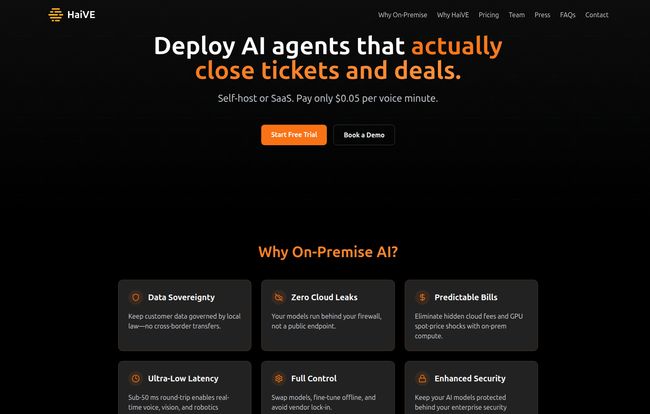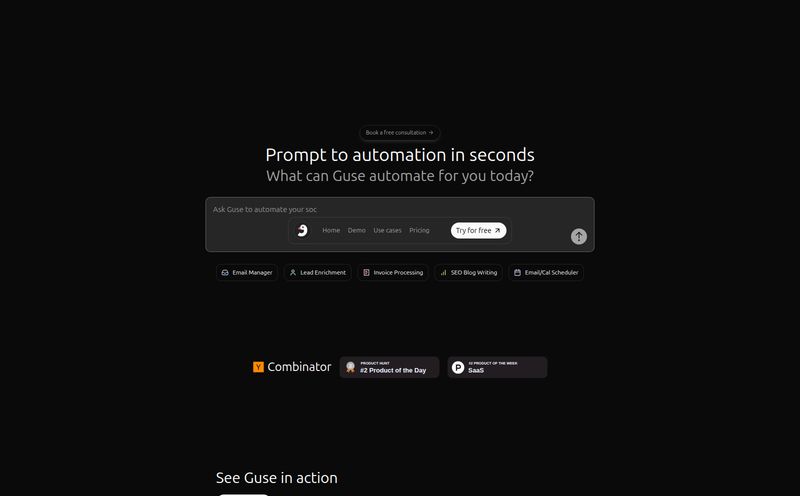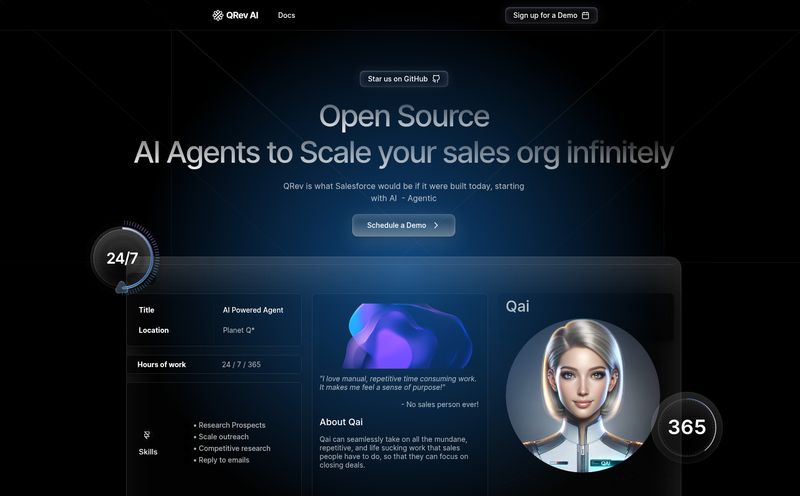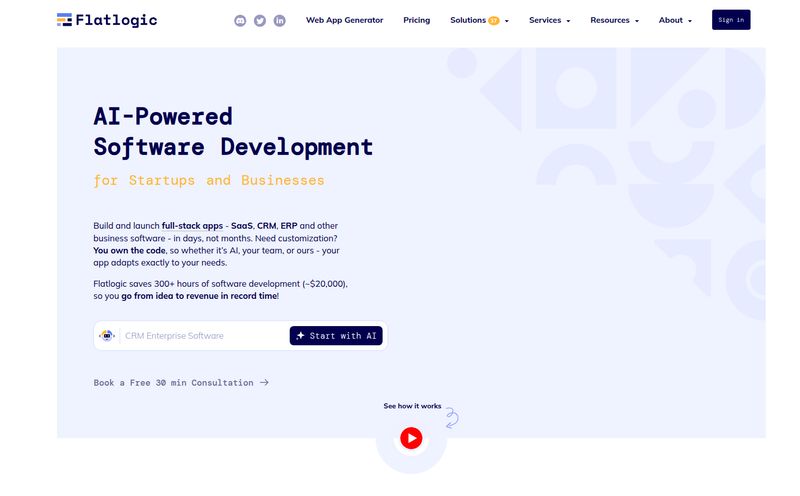I swear, if I see one more headline about a massive data breach, I might just pack it all in and become a goat farmer. We pour our hearts, souls, and—most importantly—our sensitive business data into these amazing cloud tools, crossing our fingers that the tech giants are being good stewards of our information. But are they? Really?
For years, the mantra in tech has been “cloud-first.” It’s easy, it’s scalable, it’s… everywhere. But a quiet counter-movement is gaining steam, one that’s less about convenience and more about control. It’s the idea of bringing our tech back home, behind our own firewalls. This is especially true for AI. And that’s where I stumbled upon a fascinating company called HaiVE.
They’re not just talking about AI; they’re talking about AI on your terms, on your hardware. A pretty bold proposition in today's world. So, is it just a niche product for the paranoid, or is it the future for smart businesses? Let’s get into it.
What Exactly is HaiVE Anyway?
Strip away the jargon, and HaiVE is essentially a toolkit for building and deploying your own AI agents. Think of it as your private, in-house AI workforce. Instead of piping your customer conversations and sales data to a third-party cloud service, you host HaiVE's AI right on your own servers. On-premise. The old-school way, but with brand-new tech.
Their main game is creating AI agents that can actually do stuff—like handle customer support tickets, qualify leads, and even close deals. They provide a Chat Agent API that uses some slick Natural Language Processing to understand and respond to people, 24/7. It’s designed to augment your human teams, or in some cases, act as a full-fledged virtual team for pre-sales, onboarding, and support.
The Big "Why": On-Premise vs. The Cloud
Okay, so why go through the trouble? The cloud is simple, right? Well, simplicity often comes with a hidden price tag. HaiVE's whole philosophy is built on the benefits of keeping your AI close to your chest.
Think of it like this: using a public cloud AI is like renting a megaphone in a crowded city square. You can reach a lot of people, but everyone can hear you, you're bound by the square's rules, and the rental fee might change unexpectedly. HaiVE is like building a soundproof, professional recording studio in your own office. It's yours. You set the rules. No one else gets to listen in.

Visit HaiVE
The main arguments for going on-prem, which HaiVE leans into heavily, are pretty compelling:
- Data Sovereignty: This is a big one. It means your data stays within your geographical and network boundaries. For industries like healthcare or finance, this isn't just a preference; it’s a legal requirement. You're not hoping your cloud provider is compliant; you know you are.
- Enhanced Security: By hosting AI behind your own firewall, you drastically reduce the attack surface. No cloud leaks, no shared-tenancy vulnerabilities. It's your fortress.
- Predictable Bills: I’ve seen cloud AI bills that look more like phone numbers. The pay-as-you-go models can be a wild ride. With on-premise, your main costs are the hardware and the software license. The usage cost is often far more stable and predictable.
- Full Control & Low Latency: You're not at the mercy of your cloud provider's downtime or API changes. And because the data doesn’t have to travel to a server farm halfway across the world and back, responses can be lightning fast.
A Closer Look at HaiVE's Features
So it's private and secure. Cool. But what can it do? The core of HaiVE is its customizability. It's not a one-size-fits-all chatbot. You can fine-tune the models for your specific business needs, whether that’s understanding industry-specific jargon or following a complex sales script.
A huge plus, in my opinion, is its focus on integration. An AI tool that doesn't play nice with your existing stack is just another headache. HaiVE is built to connect with the tools you already use, like Zendesk, Freshworks, and other CRMs and support platforms. This means it can actually work within your current processes, not force you to create new ones.
The idea of “AI team augmentation” is also interesting. It’s a more realistic take than the “AI will replace everyone” hysteria. You can use a HaiVE agent to handle the first tier of support queries, freeing up your human experts for the really tricky problems. That’s not a job-killer; that’s a sanity-saver.
Let's Talk Turkey: The Pricing Model
Alright, money. This is often where the on-premise dream meets a harsh reality. But HaiVE’s model is surprisingly transparent. Based on the info I've seen, they seem to be running a competitive pay-as-you-go plan.
| Provider | Model | Usage Rate | Notes |
|---|---|---|---|
| HaiVE | Pay-as-you-go | $0.05 / minute | Enterprise Plan Available |
| Vapi | Pay-as-you-go | $0.05 / minute | - |
| Bland.ai | Pay-as-you-go | $0.09 / minute | - |
| Voiceflow | Credit Model | - | Private Cloud Only |
At $0.05 per minute, their usage rate is right there with or even better than some competitors. The key difference, and you have to factor this in, is the upfront cost. HaiVE doesn’t provide the servers; you do. So while the per-minute rate is attractive, you need to account for your own infrastructure and maintenance costs. It’s the classic trade-off: higher initial investment for lower, more predictable long-term costs and greater control.
The Good, The Bad, and The Realistic
No tool is perfect, and anyone who tells you otherwise is selling something. Let’s be real about where HaiVE shines and where it might not be the best fit.
The Upsides of Keeping Your AI In-House
The biggest pro is definately the complete ownership. You own the infrastructure, you own the data, and you own the IP generated by your custom models. In an age where data is the new oil, that's a massive advantage. The customizability is also a huge win. You're not just a tenant on a massive AI platform; you're the architect of your own solution.
The Reality Check: Is It For Everyone?
Now for the other side of the coin. This is not a plug-and-play solution for a small startup running on a shoestring budget. It requires on-premise infrastructure. You need servers, you need IT staff who know how to manage them, and you need to handle the initial setup. There's a higher barrier to entry than just swiping a credit card for a SaaS subscription. For some businesses, that's a deal-breaker. For others, it’s just the cost of doing business securely.
Who Should Seriously Consider HaiVE?
After looking this all over, I’ve got a pretty clear picture of the ideal HaiVE customer. You should be looking at this if you are:
- An organization in a highly regulated industry like finance, law, or healthcare where data security and sovereignty are non-negotiable.
- A business that is tired of the unpredictable, spiraling costs of cloud services and wants a lower, more stable Total Cost of Ownership (TCO) in the long run.
- A tech-savvy company that wants to build unique, proprietary AI solutions without feeding their data to a potential competitor.
- Any enterprise that sees data privacy not as a line item, but as a core competitive advantage.
If you're a one-person shop or a small team that just needs a simple chatbot for your website, this is probably overkill. But if you're playing in the big leagues, controlling your own AI infrastructure is a power move.
My Final Take
The pendulum of technology always swings. We swung hard towards centralization and the cloud for the last decade because it was easy and powerful. Now, with growing concerns over privacy, cost, and control, we're seeing it start to swing back toward decentralized, owned infrastructure.
HaiVE is riding that wave perfectly. It's a tool for grown-up companies that understand the value of their data and are willing to invest in protecting it. It's not the easy path, but for the right business, it's almost certainly the smarter one. It represents a shift from simply using AI to truly owning your AI capabilities. And in the long run, ownership is everything.
Frequently Asked Questions about HaiVE
- 1. In simple terms, what is HaiVE?
- HaiVE provides the software to run powerful AI agents (like chatbots for sales and support) on your own servers instead of on the cloud. This gives you maximum privacy, security, and control over your data and AI models.
- 2. How is HaiVE different from a cloud AI like ChatGPT?
- The biggest difference is hosting. ChatGPT runs on OpenAI's servers, and you access it over the internet. HaiVE runs on your servers, behind your firewall. It's a choice between the convenience of a public utility and the security of a private, owned system.
- 3. How does HaiVE integrate with my existing business tools?
- It's designed for integration. With a custom Chat API, it can connect to popular platforms like Zendesk, Freshworks, and other CRMs, allowing it to work alongside your current sales and support workflows.
- 4. What kind of hardware or infrastructure do I need to run HaiVE?
- You'll need on-premise servers (or a private cloud environment). The exact specifications would depend on the scale of your operation. This is a key consideration, as it represents an upfront investment compared to cloud-only solutions.
- 5. Is the pricing really more predictable than the cloud?
- While you have an initial hardware cost, the usage-based pricing ($0.05/minute) can be more stable than the often-complex and fluctuating billing of major cloud providers. Your costs are tied to your infrastructure and a clear usage metric, not a myriad of hidden fees.
- 6. Do I actually own the AI models and the data?
- Yes. According to HaiVE, this is a core benefit. Because it's hosted on your infrastructure, you maintain complete ownership of your data and any intellectual property (IP) that's generated by the fine-tuned AI models.
Reference and Sources
- The Official HaiVE Website
- The On-Premise Imperative: Why Data Sovereignty Is Non-Negotiable - Forbes



